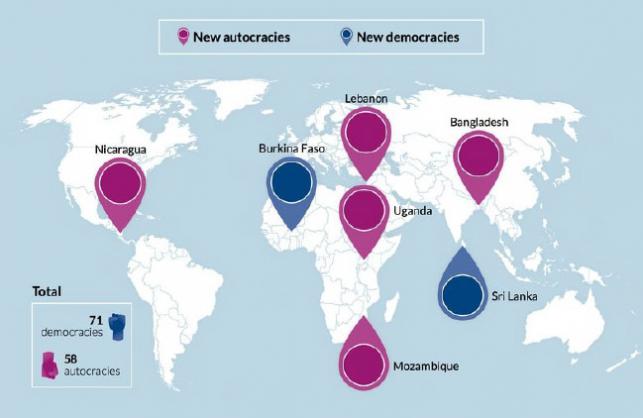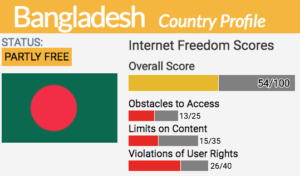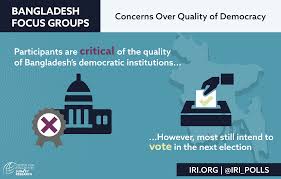 By any measure, the current state of democracy in Bangladesh is grim, note analysts Atif Ahmad, a researcher at the School of Advanced International Studies (SAIS), and Michael Kugelman, senior associate for South Asia and deputy director of the Asia Program at the Woodrow Wilson Center:
By any measure, the current state of democracy in Bangladesh is grim, note analysts Atif Ahmad, a researcher at the School of Advanced International Studies (SAIS), and Michael Kugelman, senior associate for South Asia and deputy director of the Asia Program at the Woodrow Wilson Center:
Bangladesh ranks 144th out of 180 countries in Reporters without Borders’ press freedom index ranking. Between 2014 and 2017, it fell from 85th to 92nd out of 167 countries in the Economic Intelligence Unit’s Democracy Index. One of the harshest assessments comes from a March 2018 Bertellsmann Stiftung report, which classifies Bangladesh as an autocracy because it “no longer meets minimum standards for democracy,” such as fair elections.
 Bangladesh is looking less and less democratic by the day. This slide into authoritarianism, which certainly would not be new for a nation that has experienced fifteen years of military rule over its forty-seven-year-old history, has been long in the making, they write for The National Interest:
Bangladesh is looking less and less democratic by the day. This slide into authoritarianism, which certainly would not be new for a nation that has experienced fifteen years of military rule over its forty-seven-year-old history, has been long in the making, they write for The National Interest:
Back in 2014, the Awami League was reelected in a poll that many outside observers deemed to be far from credible; the EU even declined to send election observers. The main opposition party, the Bangladesh Nationalist Party, boycotted the election in protest of the government’s decision to scrap a law that requires Parliament to be dissolved in advance of elections and replaced by a neutral caretaker administration that oversees the poll. With the Bangladesh Nationalist Party boycott, 153 out of 300 seats were elected unopposed—essentially doing away with competitive races in more than half of the country’s parliamentary contests.
“There may be a hunger among some in Bangladesh for a credible election and a more conciliatory era of politics,” they add. “Unfortunately, reading the country’s political tea leaves, such outcomes have never appeared more elusive.”
At a forthcoming briefing, panelists will offer recommendations for what more the U.S. government and the international community can do to encourage Bangladesh to protect individual rights and freedoms and ensure that the upcoming elections are free and fair.
 Elections and Human Rights in Bangladesh
Elections and Human Rights in Bangladesh
Thursday, November 15, 2018
2:30 – 3:30 p.m.
2200 Rayburn House Office Building
Capitol Hill
Washington, DC.
Panelists:
John Sifton, Asia Advocacy Director, Human Rights Watch
Waris Husain, Policy Analyst, United States Commission on International Religious Freedom
Laura Bramon, Senior Program Manager, Child Protection and Education, World Vision US
Moderator:
Mona Dave, Senior Program Officer, Asia, National Endowment for Democracy
Opening Remarks
Rep. Randy Hultgren, Co-Chair, Tom Lantos Human Rights Commission
Rep. James P. McGovern, Co-Chair, Tom Lantos Human Rights Commission
This briefing is open to Members of Congress, congressional staff, the interested public, and the media. For any questions, please contact Jamie Staley (for Mr. Hultgren) at (202-226-1516) or Jamie.Staley@mail.house.gov or Kimberly Stanton (for Mr. McGovern) at 202-225-3599 or Kimberly.Stanton@mail.house.gov.







